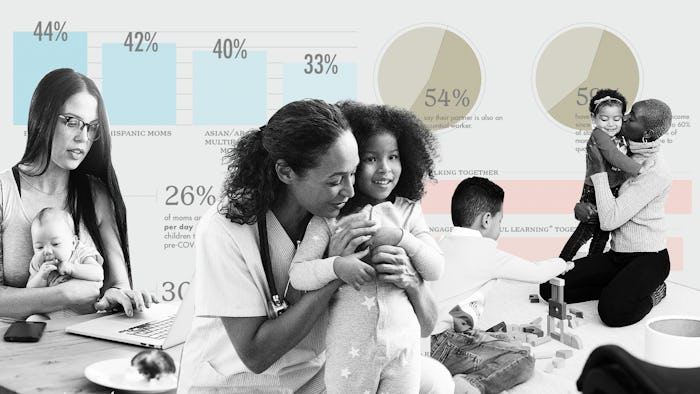News

Motherhood In The Age Of COVID-19: We Asked 2,000 Moms How They're Actually Doing This
Three years ago, right before Mother’s Day, Romper teamed up with the Clinton Foundation’s Too Small to Fail early learning initiative to ask moms how they feel about the time they spend with their children. That question seems even more relevant now that the COVID-19 pandemic has brought life as we knew it to a standstill and many moms are with their kids around the clock.
This spring, we partnered with Too Small to Fail on a new survey to better understand what moms are experiencing in quarantine — and how they’re persevering. We asked Chelsea Clinton to introduce the survey findings, sharing her reflections on how we can support each other and what must be done to make a difference for parents and families nationwide. "While it’s tempting, and certainly accurate, to refer to these women as heroes in this COVID-19 crisis," she writes, "the harsher truth is that we weren’t doing enough to support them before COVID-19, and still aren’t doing enough today." (Read her full introduction here.)
Here are our findings:
In designing a quarantine survey, we wanted to look closely at the division of labor at home, a persistent issue for all moms with partners. Our survey found that before COVID-19, a whopping 73% of moms performed the bulk of this work. Had that shifted at all during quarantine? The survey results indicate that during the shutdown, some partners are now carrying the load, perhaps due to being out of work or simply being around more as they work from home.
We also asked how much extra domestic work moms are doing now that they are almost exclusively responsible for their children’s learning and how likely their kids are, really, to “entertain themselves” for even a short period of time.
We speak only for the Romper team here, but we were astonished by how few respondents said they were disagreeing with their partners about who does what given the increased stress on families. Moms we surveyed were more focused on their economic situation, their families’ health — especially their parents’ — and ensuring that they are good mothers to their children. In the hierarchy of worry, their own health came last.
As expected given massive structural inequalities, the pandemic is disproportionately affecting moms of color — in terms of their finances, how many hours they are working, how much sleep they are getting, and even how many say they are spending too much time on social media, a behavior that has been linked to diminished well-being. Perhaps most distressing of all, moms of color are the least confident that they or their families will have access to quality health care if they need it.
For essential workers — the moms doing the work of treating the sick and keeping society open — the competing demands are almost unfathomable. That essential workers have seen a 59% drop in income since January is also difficult to reconcile. More than half of them have partners who are also essential workers, which suggests a minefield of child care worries. Many report that their employers know they are parents but still have unreasonable expectations.
Twenty percent of moms we surveyed are out of work, and that group has seen a 93% drop in income since January. Almost 40% expected their income for April to be zero. On markers of self-care, out-of-work moms of all racial backgrounds were struggling the most.
Perhaps unsurprisingly, the stress of balancing work and parenting responsibilities was most acute among respondents who are newly working from home alongside their children. They are working more hours on the weekends and in the evenings to compensate. When we asked them whether their employers have acknowledged the challenges quarantine presents for working parents, most said they have. Of moms working from home, 25% said their employer has acknowledged it but still expects too much.
Of all groups we surveyed, stay-at-home moms reported the least life or role upheaval in quarantine, with more than half saying the juggle is no more difficult now than pre-pandemic.
Two sets of data felt like a Mother’s Day gift to us all. First, when we looked at how parents feel about being with their children 24 hours a day, mom after mom said they are focusing on the gift of extra time with their kids that they might not have had otherwise. Across the board, they report talking, playing, making art, reading, and singing more with their children.
Second, we asked moms to tell us honestly whether they feel supported by other parents right now. Forty-five percent feel as supported as ever. Forty-eight percent said moms are supporting each other more or even more than they were before.
Our overarching finding was that, as ever, moms have carried their families through this unprecedented time, and they have faced its extraordinary challenges with strength and resilience. This Mother’s Day, let’s celebrate that, and then, as Chelsea Clinton writes in her introduction to this survey, let’s fight to get all moms the support they — we — have more than earned.
Survey methodology: On behalf of Romper and Too Small to Fail, Bustle Digital Group’s Trends team partnered with Pollfish to survey 2,000 moms around the U.S. with children ages 0-12. The survey ran from April 13 to April 17, 2020. Respondent demographics matched the most recent U.S. Census data. Geographically, 23% of respondents were from the Midwest, 17% from the Northeast, 38% from the South, and 22% from the West. The racial breakdown was 57% White, 19% Hispanic, 14% Black, 8% Asian, and 2% Other. Twenty-five percent of respondents were stay-at-home moms, and 75% live with their partner and children.
Design: Caroline Wurtzel
This article was originally published on